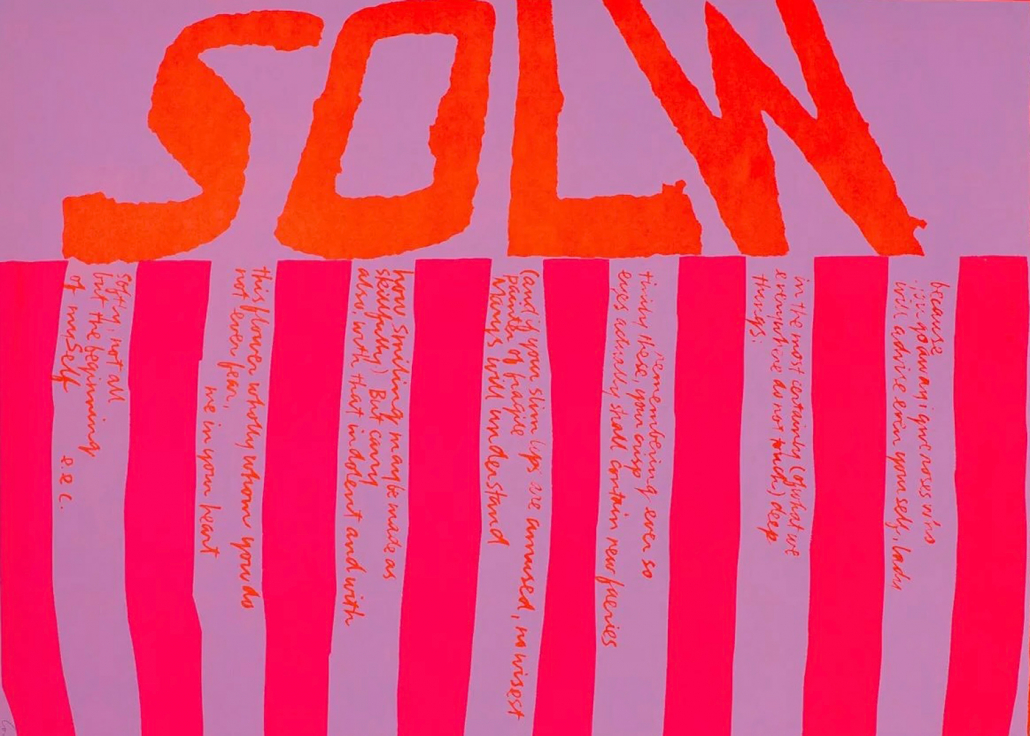Image: Corita Kent, ‘solw’, 1967, screenprint.
‘Slow time … start again’
Andrew Collis
Ordinary Sunday 21, Year C
Hebrews 12:18-29; Luke 13:10-17
The Sabbath (the seventh day) means to rest in God … or to rest with God in the beauty of Creation … which means to rest both prayerfully and playfully.
The Hebrew Bible includes many references to this Sabbath, this slow time – as commandment, as commemoration of divine rest … as commemoration of release from slavery … freedom for life together (wariness/vigilance with regard to all manner of enslavement – addiction to work, accumulation of wealth, exploitation of workers, indifference to the hardship of others, and so on).
No wonder the pharisees/rabbis worry over proper observance of the Sabbath. Slow time matters – lest we succumb to frantic self-importance, weighed down by greed or guilt.
In the New Testament and according to church tradition, Sunday (symbolically the eighth day – the day of resurrection) means to start again, to give thanks (Eucharist) for new life and recreation in Christ …
Our reading from Luke bears witness to rabbinical care (ancient and contemporary, diverse and lively) and emergent Christian liturgy. To stand tall and praise God – to stand up for others, in the Spirit of Torah and Gospel – expresses faith and wisdom.
The Christian challenge (and it is a theological and practical challenge) is to hold these two symbols, “slow time” and “start again”, to acknowledge covenants/promises in the Spirit of Torah and Gospel. A certain imaginative space is required.
“Myriad angels have gathered for the festival with the whole church … You have come to God … and have been placed with the spirits of the holy ones who have been made perfect. You have come to Jesus – the mediator who brings a new Covenant …” (Hebrews 12:22-29).
In a way, Sunday worship entails/includes/presumes Sabbath observance, affirms/honours/incorporates the commandment to rest and remember, to set free, to exchange signs of peace/shalom. Broadly speaking, this is Catholic teaching – Sabbath-Sunday as double movement of “slow time” and “start again”.
Still, there are good reasons to maintain Saturdays and Sundays as distinct holy days (it can be burdensome to roll so much into Sunday).
The Orthodox churches, for example, revere the seventh day in the Spirit of Holy Saturday, the Great Sabbath when Christ “rested” in the tomb – as occasion for prayers in loving memory of departed souls (may they rest in peace).
Catholic and Orthodox communities have long held masses on Saturdays and Sundays.
Our pattern of weekly activities is quite faithful in this regard, maintaining distinctions between the seventh and eighth days.
Our Saturday activities, in general, are sabbatical – resting in the beauty of Creation, we enjoy Wordplay, painting and drawing, gardening and praying together (pastoral care). “In the flow” of restful activities, we slow time.
I mention this that as a liturgical community we might continue to reflect on our pattern of weekly activities – wary of an evangelical tendency to privatise or psychologise the Sabbath.
Yesterday, the seventh day, elders enjoyed a spiritual retreat – a day of rest and prayer … nourishment, laughter, delight in Creation, beauty, friendship/partnership … comforting silence …
Today, we gather to give thanks (Eucharist) … for “the dearest freshness deep down things” (Gerard Manley Hopkins), the new life we experience in company with Jesus and friends. We remember departed souls, receive the gifts of the Spirit – peace, renewal, encouragement; bread and wine – and become the body of Christ …
Contrary to Puritan teaching (the Westminster Confession forbids recreational activities on the “Sabbath”), we pray and play. There’s nothing wrong with that. Sabbath and Sunday worship are joyful occasions.
I love this joyful work by Corita Kent. Inspired by street signage, it engages in wordplay. The word “slow” (Sabbath) is made strange … is transforming … begins to signify something else/more (Sunday). The artwork itself slows time and starts again.
The work includes a poem by e.e. cummings: “because you go away i give roses who will advise even yourself … and with this flower wholly whom you do not ever fear, me in your heart softly; not all but the beginning of mySelf” (1926).
There are words worth attending to – the strangeness of the syntax invites the slowing of time, and starts to make new sense: wholly (holy) … do not ever fear … in your heart softly … beginning … Amen.




